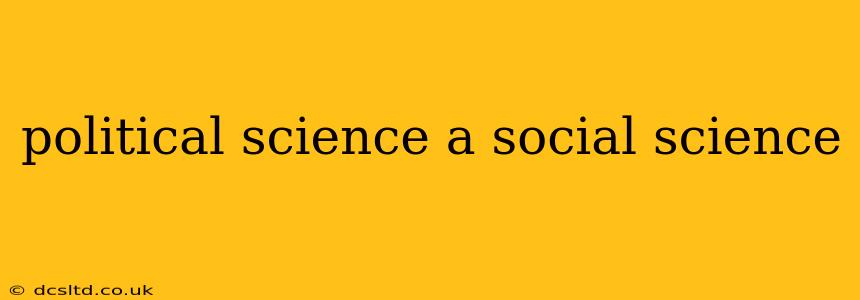Political science, with its intricate study of power, governance, and political behavior, often sparks the question: is it truly a social science? The answer, unequivocally, is yes. But understanding why requires delving into the core principles of social science and examining how political science fits within this broad academic discipline.
What Defines a Social Science?
Before classifying political science, let's establish the defining characteristics of social sciences. These disciplines systematically study human society and social relationships. Key features include:
- Empirical Observation: Social sciences rely on observable data and evidence to formulate and test hypotheses. This involves collecting data through various methods, like surveys, interviews, and statistical analysis.
- Scientific Method: Similar to natural sciences, social sciences utilize the scientific method, involving hypothesis formation, data collection, analysis, and conclusion drawing. While the complexity of human behavior introduces challenges, the underlying principle remains the same.
- Systematic Analysis: Data isn't simply collected; it's analyzed systematically to identify patterns, trends, and relationships between variables. This analysis helps researchers understand social phenomena.
- Generalizable Findings: The aim is to draw conclusions that can be generalized, at least to some extent, to a larger population or context. This differs from purely anecdotal evidence.
- Interpretive Approaches: While quantitative methods are common, qualitative methods, focusing on interpretation and meaning-making, also play a significant role in many social sciences, including political science.
How Political Science Meets the Criteria
Political science squarely fits these criteria. Consider these points:
- Empirical Data: Political scientists use extensive data sets, from election results and public opinion polls to legislative records and international relations data, to analyze political phenomena.
- Scientific Methodology: Researchers formulate hypotheses about political behavior, test them using rigorous methodologies, and draw conclusions based on the evidence. For example, studies on voting behavior often employ statistical modeling to identify factors influencing voter decisions.
- Systematic Analysis: Complex political processes are dissected using statistical analysis, comparative methods, and case studies to understand causal relationships and identify patterns.
- Generalizable Findings: While the specifics might vary across contexts, many findings in political science offer broader insights into political systems and behavior. For instance, research on democratic transitions often draws general conclusions applicable across different nations.
- Interpretive Analysis: Qualitative methods, such as discourse analysis and case studies, are vital in understanding the nuances of political ideologies, policies, and decision-making processes.
Why Some Might Question Its Status
The debate, if it exists at all, often stems from the inherent complexities of studying human behavior. Unlike natural sciences with relatively predictable phenomena, the study of politics involves actors with agency, unpredictable events, and complex interactions. However, this complexity doesn't negate the scientific approach; instead, it challenges researchers to develop sophisticated methodologies to account for these complexities.
H2: What are the different branches of political science?
Political science encompasses several subfields, each employing unique methodologies and focusing on specific aspects of the political world. These include:
- Comparative Politics: Examines political systems across different countries, identifying similarities, differences, and the factors shaping these variations.
- International Relations: Focuses on interactions between states, international organizations, and other actors in the global arena, exploring topics like war, peace, and diplomacy.
- American Politics: Specifically studies the US political system, including its institutions, parties, and political processes. This can extend to state and local levels as well.
- Political Theory: Analyzes fundamental political concepts, ideologies, and philosophies, exploring questions of justice, power, and the ideal state.
- Public Policy: Focuses on the creation, implementation, and evaluation of government policies, often involving analysis of policy impacts and effectiveness.
H2: What are some common methods used in political science research?
Political scientists employ a diverse range of methods to gather and analyze data:
- Quantitative Methods: Statistical analysis of large datasets, such as election results, public opinion polls, and economic indicators.
- Qualitative Methods: In-depth case studies, interviews, and textual analysis of documents and speeches.
- Experimental Methods: Controlled experiments to test hypotheses about political behavior, often involving surveys or simulations.
- Comparative Methods: Comparing political systems or events across different countries or time periods.
H2: How does political science differ from other social sciences?
While political science shares many similarities with other social sciences like sociology, economics, and anthropology, it has a distinct focus:
- Sociology: Broader focus on social structures, institutions, and group behavior; political science focuses specifically on power, governance, and political behavior.
- Economics: Emphasizes economic factors and their influence on political outcomes; political science considers a wider range of factors shaping political decisions.
- Anthropology: Studies human cultures and societies across different time periods and geographical locations; political science focuses specifically on political aspects of societies.
In conclusion, political science's rigorous application of empirical methods, systematic analysis, and commitment to the scientific method firmly establishes it as a social science. Its unique focus on power, governance, and political behavior sets it apart, yet its integral place within the social science family remains unquestionable.
